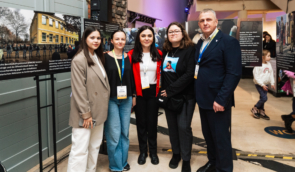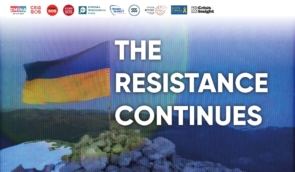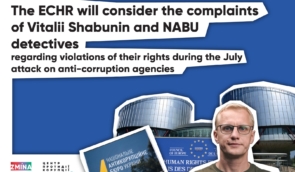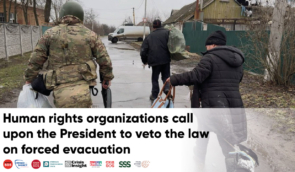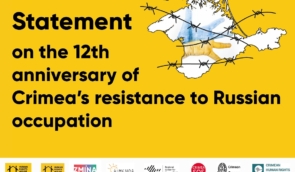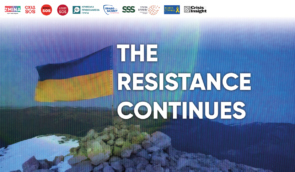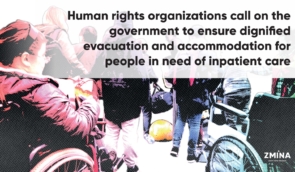Systematic denial of fair trial rights in Russia’s war against Ukraine presented at OSCE Warsaw Human Dimension Conference
On October 10, a side event at the Warsaw Human Dimension Conference focused on the systematic denial of fair trial rights during Russia’s ongoing war against Ukraine. An event, moderated by Mr. Frantisek Med, Deputy Head of Mission of the Czech Republic to the OSCE, brought together researchers, experts, and survivors to present findings from a report on arbitrary detentions, show trials, and judicial persecution of Ukrainian civilians and prisoners of war (POWs).
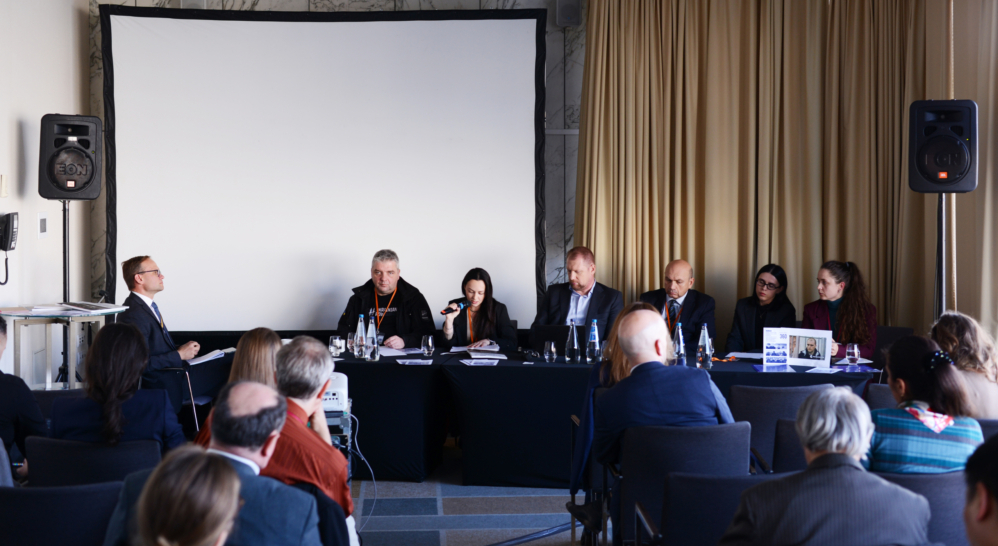 Photo credit: Media Initiative for Human Rights
Photo credit: Media Initiative for Human RightsOleh Hushchyn, representative of the Coordination Headquarters for the Treatment of Prisoners of War, opened the session with an overview of detention practices for Ukrainian POWs and civilians. “We documented 1,041 cases involving POWs, mostly charged with terrorism, espionage, and war crimes, and 761 civilian cases, primarily linked to terrorism and espionage,” he said. He emphasised that these individuals are held across occupied territories, Russia, and even Belarus, often without access to legal counsel or family visits.
Gushchyn also highlighted the widespread use of torture. “Among 576 cases of torture or ill-treatment during detention, 385 involved combatants and 194 civilians,” he explained. He stressed that these abuses are not isolated incidents, but part of a systematic pattern to suppress resistance and intimidate Ukrainian citizens.
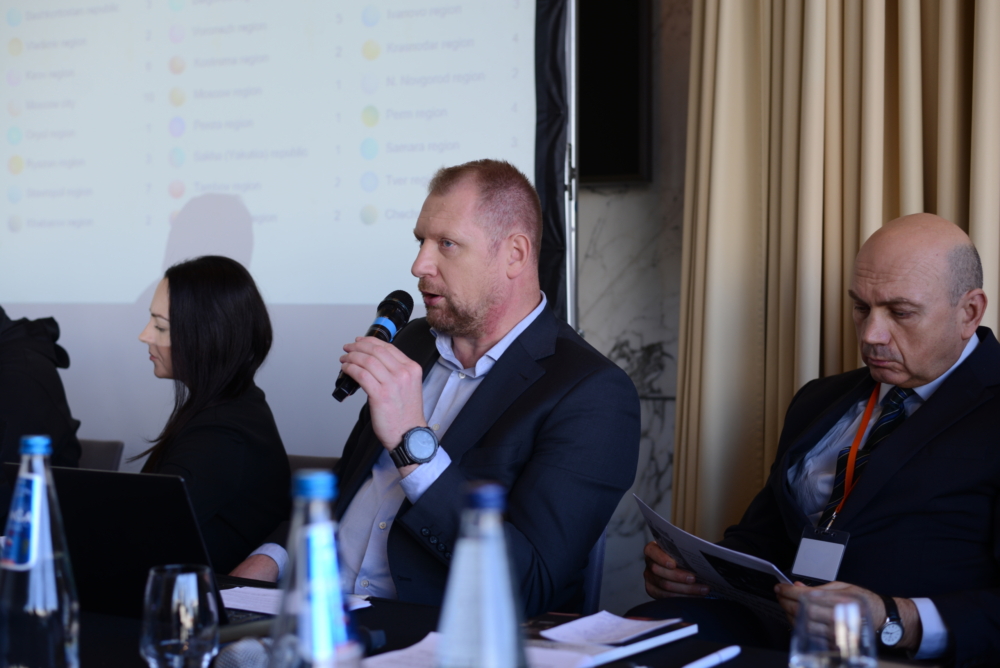 Photo credit: Media Initiative for Human Rights
Photo credit: Media Initiative for Human RightsViktoriia Nesterenko from Human Rights Centre ZMINA focused on judicial persecution of civilians. She noted that 95 trials were monitored in occupied Crimea. “We defined that Russia uses trials as one of the mechanisms of suppression of resistance and freedom of speech in the occupied territories.” Since the full-scale invasion, the number of cases on criminal articles “sabotage”, “espionage” and “high treason” has risen significantly, as well as the number of cases against women.
She added that court hearings on accusations of “espionage” and “high treason” are closed in the Russian Federation — relatives, activists, media representatives are not allowed there; lawyers sign a non-disclosure agreement and cannot share any information. However, the Russian General Prosecutor’s Office closely cooperates with Russian media outlets, which spread propaganda about the court hearings.
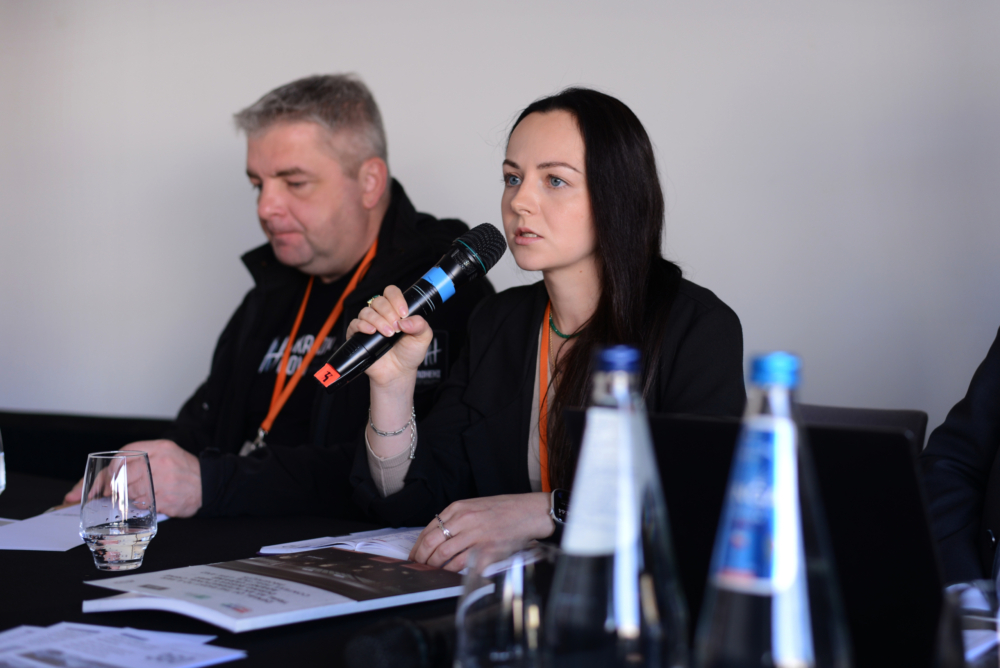 Photo credit: Media Initiative for Human Rights
Photo credit: Media Initiative for Human RightsLyubov Smachylo from Media Initiative for Human Rights presented her team’s findings on POW trials. “Since 2022, we have documented 500 trials of Ukrainian POWs in Russia, 373 in occupied territories, 297 civilian trials in Russia, and 326 in occupied territories,” she said. Smachylo explained that charges are often fabricated, including terrorism, extremism, or war crimes, with little or no evidence.
She also emphasised the role of Russian state-controlled media in legitimising judicial persecution. “Russian media, whether state-owned, private, or individual bloggers, act as accomplices in these crimes, labelling defendants with propaganda terms, accusing them of murder or terrorism without any court decisions, and calling them ‘Ukrainian Nazis’,” she said. This coordinated media strategy systematically violates the presumption of innocence and supports Russia’s punitive policies.
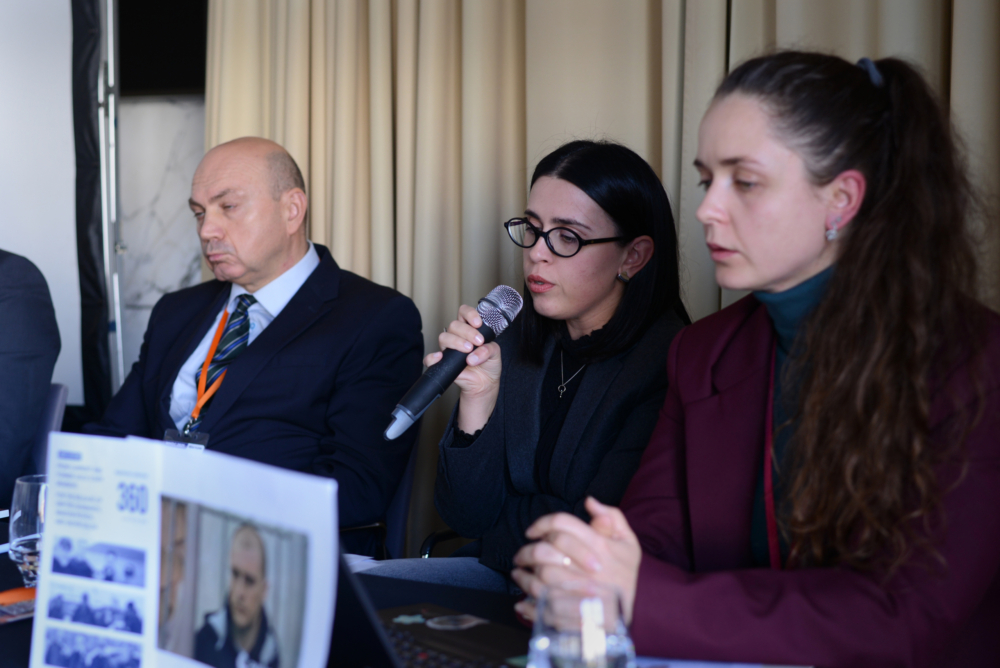 Photo credit: Media Initiative for Human Rights
Photo credit: Media Initiative for Human RightsSergiu Ostaf summarised the research, framing these practices in the broader context of international law. “The overall pattern constitutes a crime against humanity — a persecution through denial of fair trial affecting both civilians and military personnel,” he said.
The research drew on data from human rights organisations and independent monitors, encompassing about 600 court cases. According to the findings, between 70% and 80% of all observed trials violated key principles such as judicial independence, public hearings, and presumption of innocence. Courts were found to be politically influenced, often acting under direct coordination from Russian security services and the Presidential Administration.
Ostaf highlighted a collapse of legal standards in Russia-controlled courts, where judgments often replicate prosecutors’ indictments almost word for word, ignore evidence obtained under torture, and impose harsh, politically motivated sentences. Discrimination and bias against Ukrainian civilians and prisoners of war are present in 90-100% of the analysed judgments. These violations are not isolated incidents but part of a deliberate state policy of repression under the guise of “denazification”.
The expert called for stronger international mechanisms to document and address abuses, urging the OSCE’s Moscow Mechanism to investigate judicial persecution as a potential crime against humanity. He recommended creating an ODIHR expert on fair trial violations, bolstering civil society monitoring, and using the OSCE Media Representative to track state propaganda. He also advocated for closer UN-OSCE cooperation to provide evidence to the ICC and encouraged European states with universal jurisdiction to help pursue accountability.
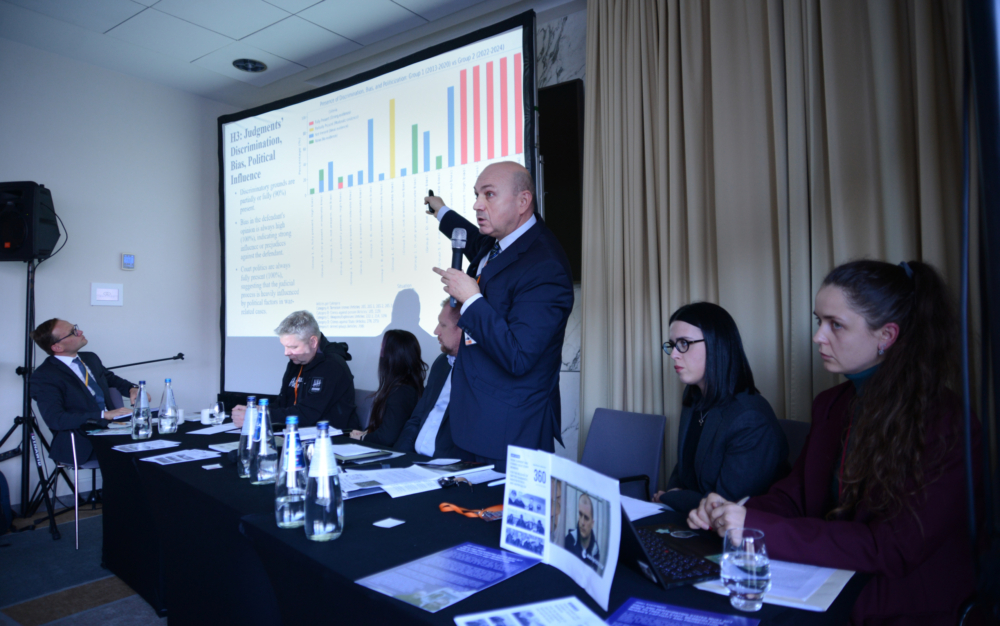 Photo credit: Media Initiative for Human Rights
Photo credit: Media Initiative for Human RightsMaksym Butkevych shared his personal experience of imprisonment and trial. He was forced to sign the confession: “I did not even know what I was accused of — they covered the text with a sheet of paper. Within half a year, I read the accusation paper, stating that I, without any particular reason, tried to kill two local ladies in Severodonetsk city of the Luhansk region. Russians loved the picture of the Ukrainian punisher trying to kill the civilian population from the German-produced RPG — it would fit well in the propaganda narrative“. However, Butkevych has never been to Severodonetsk, and on the date of the alleged “crime”, he was in Kyiv.
Maksym’s decided to exhaust all the legal remedies to show how inaccessible it is when it comes to Ukrainians. He provided evidence about the impossibility of the commission of the crime to the Court of Cassation and explained that the testimony was given under pressure. However, the court just dismissed it.
“This system encompasses not only POWs but also civilians. I had the chance to see some of them, in particular OSCE officers Dmytro Shabanov and Maksym Petrov. Everyone I met had gone through a system of torture and was forced to sign a confession, no matter how absurd the accusations were,” said Butkevych.
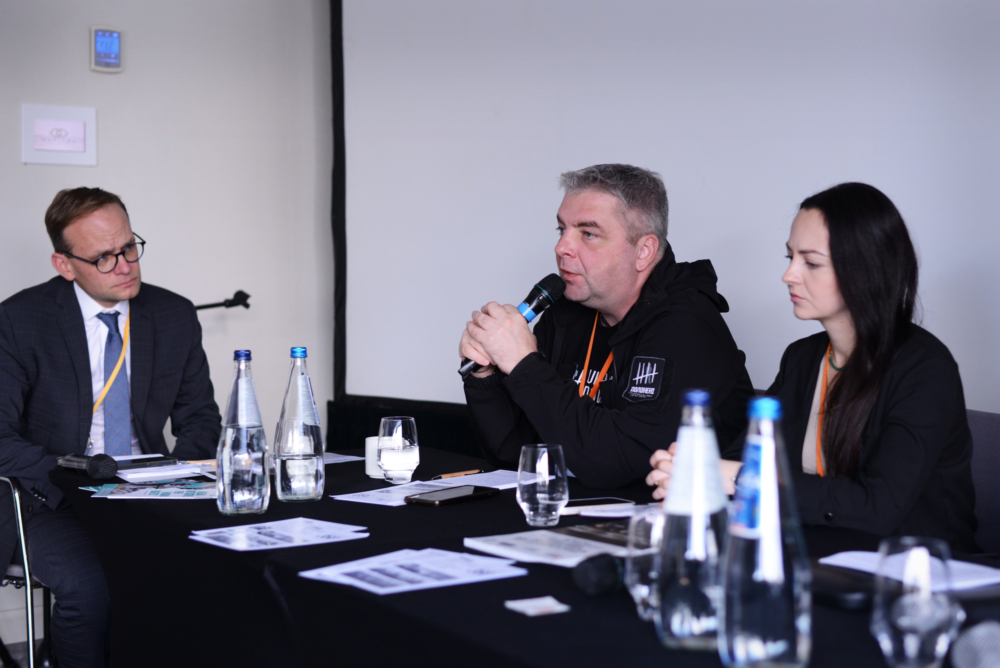 Photo credit: Media Initiative for Human Rights
Photo credit: Media Initiative for Human RightsMarharyta Shabanova shared the harrowing story of her husband, Dmytro Shabanov, an OSCE Special Monitoring Mission official who was unlawfully detained by Russian authorities in April 2022 while performing his duties in Luhansk. Shabanova described the initial incommunicado detention and subsequent trial: “Despite having OSCE immunity, Dmytro and his colleague Maksym Petrov were sentenced by the ‘Supreme Court in Luhansk’ to 13 years in prison for ‘high treason’ — simply for doing their jobs. The court proceedings were televised, but there was no transparent legal process“. She emphasised that the charges were politically motivated and unsupported by any evidence of criminal activity.
Shabanova detailed the physical and psychological toll of her husband’s detention. “The first news I had of Dmytro was a video circulated by Russian media in July 2022. He appeared emaciated, with hollow cheeks, lost weight, unhealthy skin, and his t-shirt torn. Witnesses confirmed that he was tortured during interrogations until he lost consciousness several times and was subjected to extreme psychological pressure with no proper medical care“. In January 2025, Dmytro’s sentence was revised under Russian law, resulting in his deportation to a penal colony in Omsk, Siberia, where he has remained in harsh conditions.
Shabanova called on the OSCE and the international community to take urgent action. “We need strategic negotiation, visible efforts, and coordinated pressure. Releasing Dmytro and his colleagues, Maksym and Vadym, will allow our family’s life to begin again,” she said. “The personal impact on families is incalculable. Their detention is a violation of international law and basic human rights. We need more than sympathy — we need resolve. Time is not on our side“.
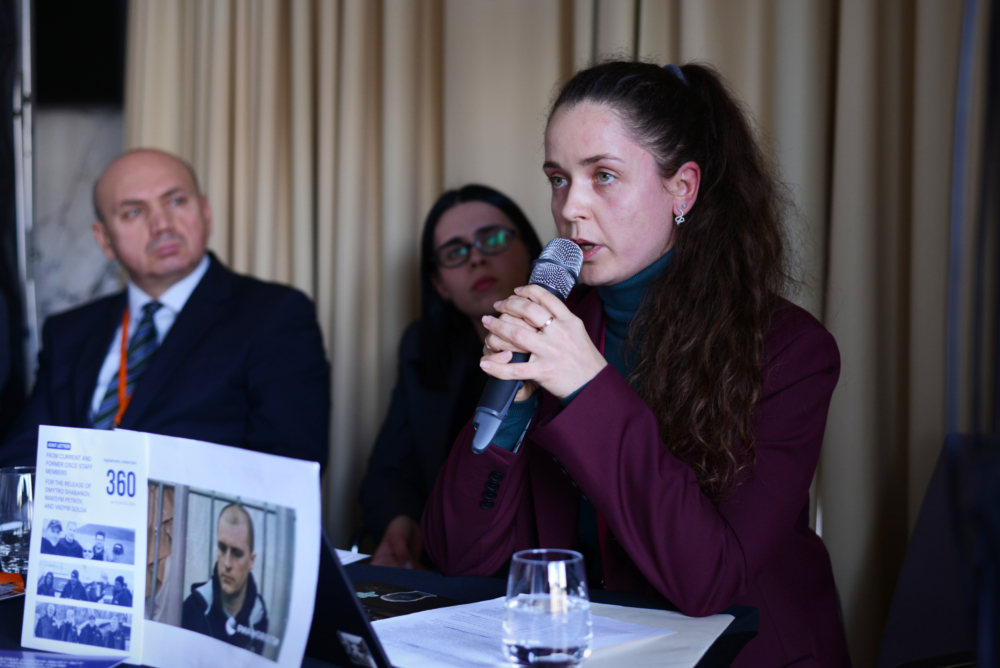 Photo credit: Media Initiative for Human Rights
Photo credit: Media Initiative for Human RightsThis side event was organised by the Human Rights Centre ZMINA and Media Initiative for Human Rights with the support of the Czech Delegation to the OSCE, Human Rights House Foundation, and the Netherlands Helsinki Committee. It was made possible with the assistance of the Ministry of Foreign Affairs of the Czech Republic as part of the Transition Promotion Program.
If you have found a spelling error, please, notify us by selecting that text and pressing Ctrl+Enter.


